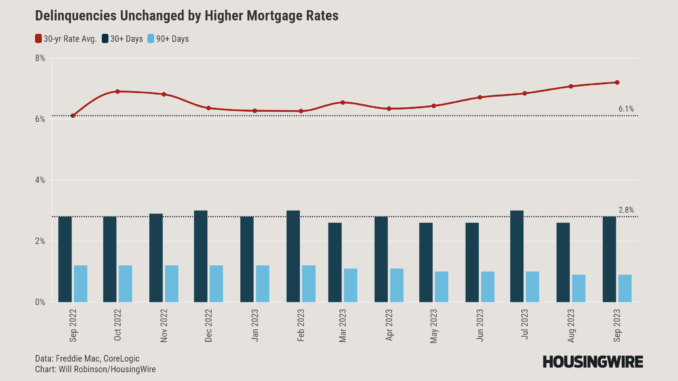
In September 2022, the 30-year fixed mortgage rate averaged 6.1%, according to Freddie Mac data. Fast-forward one year, and the rate averaged 7.2%, an expensive difference for many homebuyers (rates have since started to drop).
But compare mortgage delinquencies over the same period: 2.8% in September 2022, 2.8% in September 2023, according to CoreLogic data.
CoreLogic’s Loan Performance Insights data, shared with HousingWire, represents foreclosure and delinquency activity reported for first liens against a property. It encompasses approximately 75% of the nation’s foreclosure data.
CoreLogic principal economist Molly Boesel attributes much of the stability in the low delinquency rate to low unemployment over the period.
“The overall U.S. delinquency rate was unchanged from one year ago in September and remains near an all-time low,” Boesel said. “While there was a decrease in the share of mortgages six months or more past due, there was a compensating increase in early-stage delinquencies. If the labor market weakens in the coming months, expect further increases in mortgage delinquencies.”
There are exceptions, however, to the stable and low delinquency rates seen at the national level. CoreLogic’s LPI report highlights one common factor: natural disasters.
Kahului-Wailuku-Lahaina, which suffered significant damage from wildfires in August, had the largest year-to-year increase in delinquency rates in the country – more than 140 other U.S. metros that netted year-to-year increases in September. The metro’s delinquency rate rose 3.5 percentage points to 5.7%.
The report also notes that delinquency rates remain higher in Punta Gorda and Cape Coral-Fort Myers, metros in Florida that were hit by Hurricane Ian in September 2022.
That is noteworthy, considering that a recent Redfin analysis concluded Americans are increasingly moving to counties prone to flooding, wildfires and excessive heat, areas sometimes abandoned by insurers.
The majority of cities in the U.S. saw their delinquency rates hold or fall on a year-to-year basis in September.
Serious delinquency rates – defined as delinquencies of 90 days or more – were even rosier for most U.S. cities. The rate fell for 367 metro areas, stayed the same for 14 and rose in only three: Punta Gorda, Cape Coral-Fort Myers and Elkhart-Goshen, Indiana.
The state-level view is similar. Rates of delinquencies of 30 days or more rose year-to-year in only 15 states, and the largest increase – South Dakota – was only half a percentage point.



